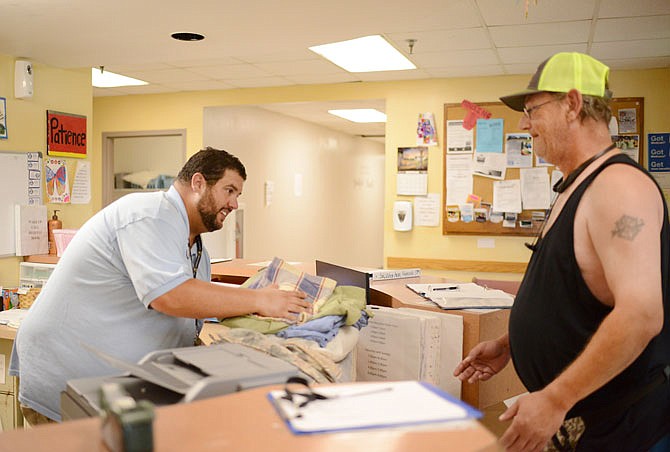When he arrived at work Wednesday morning, Brian Vogeler had 10 messages on his phone.
It gave Vogeler, the director of The Salvation Army's Center of Hope, a sinking feeling.
At least five of the messages were from people looking for shelter.
But the center is at capacity, as it has been almost constantly since May 22.
And he had to turn them away.
The center is equipped with 31 beds.
It is able to serve women and men individually and to serve two families.
And as soon as one family moves out, another moves in, which was the case Wednesday afternoon, Salvation Army Capt. Justin Windell said. Windell and his wife are the corps officers for The Salvation Army Jefferson City.
"It's to the point where, if one person is able to move out because they've secured residency someplace, there are three people in line waiting for that bed," Windell said. "That's very concerning for us - especially going into the winter. Winter is usually when we're busy."
Summers can be busy, but not like this year.
"We're also seeing a lot more families than we had," he continued. "At times, we'll have multiple families in the shelter."
The Center of Hope usually has a single family that needs to stay. But this summer - stretching into the fall - the shelter has had a "steady flow of families," Vogeler said.
"Those are the hardest to turn away when we have no room available for them," Windell said.
The EF-3 tornado in May seems to be the main contributing factor that has kept the shelter at capacity, Vogeler said.
Although it is set up to handle only two families, when the shelter needs to accommodate more than that, it does so by using rooms intended for individuals, if possible.
When people come to the shelter looking for housing, staff have interviewed them concerning their situations.
One thing staff members have found is housing prices are out of reach for clients. People coming to the shelter are unable to find housing that costs less than $500 a month, Windell said.
"There's no low-income housing (in Jefferson City)," Vogeler said. "We went from short to really short."
During a special Jefferson City Council work session Monday, it was estimated the city lost more than 150 housing units during the tornado.
In Cole County and Jefferson City, 611 buildings sustained enough damage during the tornado to be listed on a preliminary assessment report released July 8.
In Cole County, 516 residential buildings sustained damage, 382 of which were within Jefferson City.
If the housing crunch isn't bad enough, the shelter is now also feeding more people than it has in the past.
There are enough people coming to the dining room for meals each day that the shelter has to feed people in shifts, Vogeler said.
"Residents will eat at a certain time," he said. "Then we'll have the community come in and have a little extra time."
That time is necessary to get families through the lines, Windell offered.
The shelter served more than 25,000 meals last year, Vogeler said. It will soon surpass that for 2019.
"We are looking for groups to help serve the community meals," Windell said. "There are always openings - a need for groups to come and help prepare the meals and serve."
It's a good way to meet people "on the front lines," he said.
To volunteer, call the shelter at 573-635-1975.
Since before the Windells arrived at the shelter, the food pantry has been short on protein - meat - Windell said.
"We got a lot of non-perishable items right after the storm that have helped out a lot in the food pantry," he said. "But meat - and those fresher items - have gone down to very low levels at times."
People simply wished to help how they'd been instructed, by giving canned items and other items that could be stored indefinitely.
There is still tornado-related direct assistance The Salvation Army is handling on a daily basis, he said, including the shelter and meals programs.
The Salvation Army continues to receive food from the Food Bank for Central & Northeast Missouri, grocers and other outlets, but could use some donations, Windell said.
"We try to stretch our dollars as well as we can," he said. "We're trying to get more food for our community meals. Food is something that is tangible, that people can help with."

